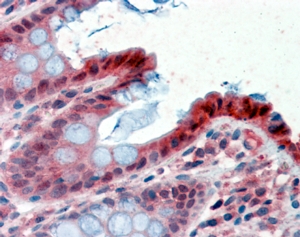Goat Anti-Prostaglandin dehydrogenase 1 Antibody
Peptide-affinity purified goat antibody
- SPECIFICATION
- CITATIONS
- PROTOCOLS
- BACKGROUND

Application
| WB, IHC, E |
|---|---|
| Primary Accession | P15428 |
| Other Accession | NP_000851, 3248 |
| Reactivity | Human |
| Host | Goat |
| Clonality | Polyclonal |
| Concentration | 100ug/200ul |
| Isotype | IgG |
| Calculated MW | 28977 Da |
| Gene ID | 3248 |
|---|---|
| Other Names | 15-hydroxyprostaglandin dehydrogenase [NAD(+)], 15-PGDH, 1.1.1.141, Prostaglandin dehydrogenase 1, HPGD, PGDH1 |
| Dilution | WB~~1:1000 IHC~~1:100~500 E~~N/A |
| Format | 0.5 mg IgG/ml in Tris saline (20mM Tris pH7.3, 150mM NaCl), 0.02% sodium azide, with 0.5% bovine serum albumin |
| Storage | Maintain refrigerated at 2-8°C for up to 6 months. For long term storage store at -20°C in small aliquots to prevent freeze-thaw cycles. |
| Precautions | Goat Anti-Prostaglandin dehydrogenase 1 Antibody is for research use only and not for use in diagnostic or therapeutic procedures. |
| Name | HPGD (HGNC:5154) |
|---|---|
| Synonyms | PGDH1, SDR36C1 |
| Function | Catalyzes the NAD-dependent dehydrogenation (oxidation) of a broad array of hydroxylated polyunsaturated fatty acids (mainly eicosanoids and docosanoids, including prostaglandins, lipoxins and resolvins), yielding their corresponding keto (oxo) metabolites (PubMed:10837478, PubMed:16757471, PubMed:16828555, PubMed:21916491, PubMed:25586183, PubMed:8086429). Decreases the levels of the pro- proliferative prostaglandins such as prostaglandin E2 (whose activity is increased in cancer because of an increase in the expression of cyclooxygenase 2) and generates oxo-fatty acid products that can profoundly influence cell function by abrogating pro-inflammatory cytokine expression (PubMed:15574495, PubMed:25586183). Converts resolvins E1, D1 and D2 to their oxo products, which represents a mode of resolvin inactivation. Resolvin E1 plays important roles during the resolution phase of acute inflammation, while resolvins D1 and D2 have a unique role in obesity-induced adipose inflammation (PubMed:16757471, PubMed:22844113). |
| Cellular Location | Cytoplasm. |
| Tissue Location | Detected in colon epithelium (at protein level). |

Thousands of laboratories across the world have published research that depended on the performance of antibodies from Abcepta to advance their research. Check out links to articles that cite our products in major peer-reviewed journals, organized by research category.
info@abcepta.com, and receive a free "I Love Antibodies" mug.
Provided below are standard protocols that you may find useful for product applications.
Background
This gene encodes a member of the short-chain nonmetalloenzyme alcohol dehydrogenase protein family. The encoded enzyme is responsible for the metabolism of prostaglandins, which function in a variety of physiologic and cellular processes such as inflammation. Mutations in this gene result in primary autosomal recessive hypertrophic osteoarthropathy and cranioosteoarthropathy. Multiple transcript variants encoding different isoforms have been found for this gene.
References
Genetic variation and antioxidant response gene expression in the bronchial airway epithelium of smokers at risk for lung cancer. Wang X, et al. PLoS One, 2010 Aug 3. PMID 20689807.
A genetic association study of maternal and fetal candidate genes that predispose to preterm prelabor rupture of membranes (PROM). Romero R, et al. Am J Obstet Gynecol, 2010 Jul 29. PMID 20673868.
Variation at the NFATC2 Locus Increases the Risk of Thiazolinedinedione-Induced Edema in the Diabetes REduction Assessment with ramipril and rosiglitazone Medication (DREAM) Study. Bailey SD, et al. Diabetes Care, 2010 Jul 13. PMID 20628086.
Identification of fetal and maternal single nucleotide polymorphisms in candidate genes that predispose to spontaneous preterm labor with intact membranes. Romero R, et al. Am J Obstet Gynecol, 2010 May. PMID 20452482.
Loss of 15-hydroxyprostaglandin dehydrogenase expression contributes to bladder cancer progression. Tseng-Rogenski S, et al. Am J Pathol, 2010 Mar. PMID 20093479.
If you have used an Abcepta product and would like to share how it has performed, please click on the "Submit Review" button and provide the requested information. Our staff will examine and post your review and contact you if needed.
If you have any additional inquiries please email technical services at tech@abcepta.com.













 Foundational characteristics of cancer include proliferation, angiogenesis, migration, evasion of apoptosis, and cellular immortality. Find key markers for these cellular processes and antibodies to detect them.
Foundational characteristics of cancer include proliferation, angiogenesis, migration, evasion of apoptosis, and cellular immortality. Find key markers for these cellular processes and antibodies to detect them. The SUMOplot™ Analysis Program predicts and scores sumoylation sites in your protein. SUMOylation is a post-translational modification involved in various cellular processes, such as nuclear-cytosolic transport, transcriptional regulation, apoptosis, protein stability, response to stress, and progression through the cell cycle.
The SUMOplot™ Analysis Program predicts and scores sumoylation sites in your protein. SUMOylation is a post-translational modification involved in various cellular processes, such as nuclear-cytosolic transport, transcriptional regulation, apoptosis, protein stability, response to stress, and progression through the cell cycle. The Autophagy Receptor Motif Plotter predicts and scores autophagy receptor binding sites in your protein. Identifying proteins connected to this pathway is critical to understanding the role of autophagy in physiological as well as pathological processes such as development, differentiation, neurodegenerative diseases, stress, infection, and cancer.
The Autophagy Receptor Motif Plotter predicts and scores autophagy receptor binding sites in your protein. Identifying proteins connected to this pathway is critical to understanding the role of autophagy in physiological as well as pathological processes such as development, differentiation, neurodegenerative diseases, stress, infection, and cancer.



